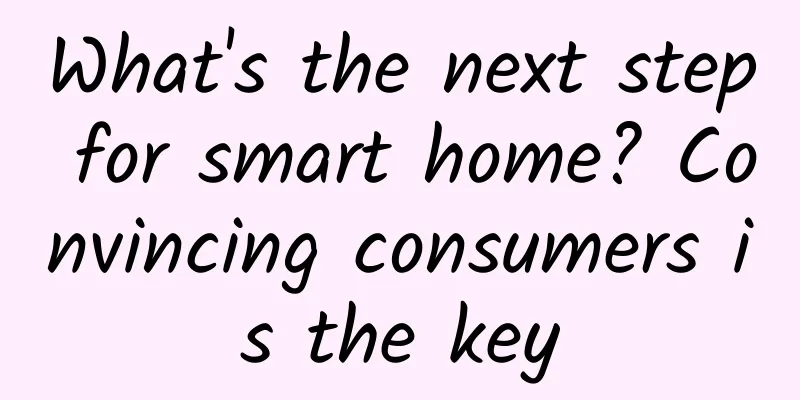What's the next step for smart home? Convincing consumers is the key

|
Do you use Nest to control your oven? Is your car connected to the internet? Do you wear a smartwatch or Google Glass? If you answered yes, then you are using the Internet of Things and you can say you are a trendsetter. However, this is just the beginning. The next step is to connect the electronic parts of all the hardware you own together, and this trend has already begun. At the Internet of Things Forum in London this month, many companies came together to discuss how to speed up the adoption of the Internet of Things. Unfortunately, if you have a vision of a simple, cross-platform connected home, you may have to wait a while before you see it, and the entire Internet of Things industry will have to wait too. What's the problem? Because no one is standing up to promote the Internet of Things. "This is why you need a connected home, it's really amazing!" Because no one is sure what the future of the Internet of Things will look like. People can't find a compelling reason to pay for the Internet of Things technology, which seems to be an important reason hindering the promotion of the Internet of Things. Although it has been called a variety of names and no one has quite figured out how to make the technology truly useful or how to unlock the all-important money-making machine, the Internet of Things has been around for several years. What is the solution and who will provide it? It is almost a consensus that the Internet of Things will take off one day. Regardless of the purpose of the various connected devices in the home and who makes them, people need all the connected devices in the home to be connected and able to communicate with each other. One solution is to use a central controller to achieve interconnection, which can filter all the collected data and synchronize them in the cloud. Microsoft 's presence at the Internet of Things Forum in London has attracted a lot of attention. Will it introduce its big plans for the Internet of Things at the conference? Steve Dunbar, Microsoft's business director for Internet of Things, gave a speech at the Internet of Things Forum. Is Microsoft the hero we missed? No, it is promoting its Azure cloud computing platform, which can provide a base camp for other companies to build the Internet of Things. Microsoft is not ready to enter this field and bring revolutionary changes to consumers' homes. It only provides related software. Grant Peters, senior Internet of Things solutions expert at Microsoft, said that the company does not plan to grow this part of the business in the future, nor is it considering working with a hardware manufacturer to produce home central devices. Using the Nest oven as an example, Peters discussed how the Internet of Things must first establish a single central control device before it can grow and develop. Microsoft's idea is that all connected devices in the home will be authenticated before they can be controlled by Nest and their data will be sent to Nest. Nest will then sync with the cloud and provide data to third-party applications and systems. If this idea works, it would solve the problem of connecting different products from different manufacturers, so there is no need to require manufacturers to interoperate with each other. Instead, all connected devices can interoperate with Nest. Just like Apple 's Made For iPhone system, smart home devices must be certified by Nest, so that consumers can easily buy compatible products. Telefonica, which owns the UK's O2 network and many other different types of networks around the world, has also had this idea, envisioning a core IoT device that would be a smart monitoring device managed by the power company. Jon Carter, head of connected home at Deutsche Telekom/T-Mobile, also talked about the idea of a universal device to connect all smart home devices. Cattell is an avid supporter of openness, saying that if the Internet of Things is to grow and prosper, the industry must abandon closed, patent-protected systems and build its own around open APIs and adherence to open standards so it can work with as many devices as possible. That's a good thing, and here's why: There are at least 50 different connected home platforms out there, and they're in various stages of development. However, not all of them are going to survive. When T-Mobile's smart home hub came out, we heard there would be a jumpstart program to go with it, aimed at helping people choose the right hardware. Interestingly, Carter summed up his feelings about all the attempts to stimulate the IoT industry by saying, “Despite all the hype, we are irritated.” The biggest challenge is how to get consumers to accept this idea. Clearly, the battle for control of the Internet of Things will continue, whether it's Google, Apple, Microsoft or some other company outside the home, the mysterious big guy has yet to surface. Smart homes are cool and make us feel like we're living in the future, but we don't yet know what the benefits of owning this technology are. At this point, the biggest selling point for the Internet of Things is just reducing electricity bills, so companies like Nest and Tado are more attractive. Your electricity and internet service providers may also win in this competition. Telefonica has already formed a partnership with AT&T, and it intends to transform its digital life platform into a global Internet of Things system. The Internet of Things also has some negative effects on us. In addition to spending a lot of money to buy new hardware and paying a certain amount of service fees every month, we must also give up a lot of personal information to achieve this automation. This is difficult for consumers to accept, and no one can convince consumers that these expenses and giving up personal information are worth it. It's no surprise that many companies, including Microsoft, are now focusing on selling the concept of the Internet of Things to business users, because the value here is very clear: The Internet of Things can simplify processes and ultimately save money. Until a unifying hero establishes his dominance, the Internet of Things will remain fragmented, unorganized, and chaotic, and most consumers' homes will remain the same. As a winner of Toutiao's Qingyun Plan and Baijiahao's Bai+ Plan, the 2019 Baidu Digital Author of the Year, the Baijiahao's Most Popular Author in the Technology Field, the 2019 Sogou Technology and Culture Author, and the 2021 Baijiahao Quarterly Influential Creator, he has won many awards, including the 2013 Sohu Best Industry Media Person, the 2015 China New Media Entrepreneurship Competition Beijing Third Place, the 2015 Guangmang Experience Award, the 2015 China New Media Entrepreneurship Competition Finals Third Place, and the 2018 Baidu Dynamic Annual Powerful Celebrity. |
<<: Can Momo, who has a godfather, really make a comeback?
>>: Compromise or follow the trend? Why did Sony launch Android TV smart TV?
Recommend
The practical process and precautions of APP programmatic advertising monetization!
Today, the editor will introduce in detail how to...
What is the difference between Douyin Sui Xin Tui and Dou+? How to vote with Sui Xin Tui?
Douyin Sui Xin Tui is a paid promotion method . A...
Understand the massive amount of Qianchuan delivery techniques in one article!
From the underlying algorithm of the launch, brea...
First discovered by Huygens in 1665, now a higher-order network synchronization has been discovered
A study led by Queen Mary University of London ha...
Such a cute bird! The parrot tears the paper and tries to insert "feathers" to turn into a peacock?
Not long ago, a funny video about a parrot shot b...
China Unicom's 4G strategy confirmed: centralized operation and control of marketing in various regions
At the recent China Unicom Dual 4G Leading Plan I...
Tips for recording notes on Xiaohongshu!
To understand the issue of note collection, just ...
Wuhan tea resources delivery
Wuhan high-end tea drinking is unique and very un...
From the "reputation-building missile" to Huawei's "reputation-building aircraft", what other "technological breakthroughs" are there on the road to becoming a strong country that you don't know about?
Planning: Little Dandelion, 91 Copywriter: Xiaoxi...
The little-known secrets of bananas
I think when you see the title, you will probably...
Musk: Tesla Autopilot will be fully autonomous "soon"
According to foreign media reports, Tesla CEO Elo...
Profit margin of 1.8%: Xiaomi is playing a game that will never be completed
Recently, through the announcement of Xiaomi'...
Mobile promotion conversion effect is poor? 2 steps to get everything done~
They say mobile now dominates the marketing battl...
How to build user stratification operations?
Pyramid stratification is a method of stratifying...
Today, it was officially unveiled! So beautiful!
This morning South China National Botanical Garde...









